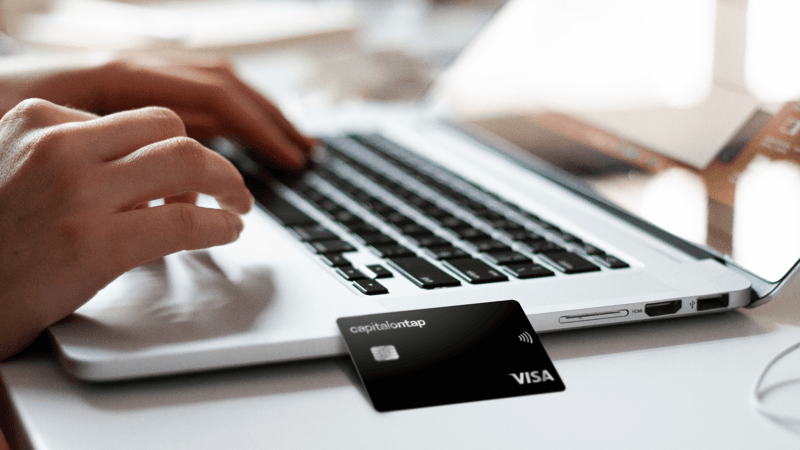Jump to a section
When you launch a business, one of the first things you’ll need to do is open a business bank account. Let’s take a look at why it’s so important, how to set up a business bank account, and what documents are required to open it.
Why should I open a business bank account?
Protect your personal funds
Keeping your company finances separate from your personal accounts protects your existing assets. Even if they are separate sources of money, if your business were to be sued and compensation awarded, your personal funds could be at risk.
Accept credit card payments
Personal bank accounts are unable to accept payments from a debit or credit card. Setting up a business bank account means your business can accept these payments, making it far more accessible for your customer base as methods such as cash or check are becoming outdated.
Avoid problems with taxes
Filing your taxes can already be enough of a headache! Keeping your accounts separate means it’s much easier to sort through and track business transactions, making tax season that much easier. It also prevents the perception of being a hobby business, which aren’t eligible for business tax deductions. By having a business bank account, it proves to the IRS that you’re a legitimate business and therefore entitled to these benefits.
Share access to company funds with others
If you have other employees or partners, it’s likely that they will need to make a payment or utilize business funds. This ties into protecting your personal finances, as it means you don’t have to give them access to your own bank account.
Access funding for your business
As your business grows, you may need to find new sources of funding. Some lenders require you to have a business bank account to pass their checks. For example, having a business credit card means you have access to a line of credit, which can also offer great rewards for you and your business.
What do I need to open a business bank account?
What you need to open your business bank account can vary depending on the bank, but here are some of the most common requirements to open an account.
1. Personal Identification
A government-issued photo ID, such as a driver’s license or passport (you may even need two) for all company directors.
2. Employer Identification Number (EIN) or Social Security Number (SSN)
Your EIN, also known as a Federal Tax Identification Number, is used to identify a business entity. It also allows the IRS to identify you easily for tax reporting purposes. If your business has one, you’ll need to provide it alongside any corresponding documents from the IRS. If you don’t have one, you can get one for free by filling out the application on the IRS’s website with your Social Security Number.
Some banks may allow sole proprietors and single-member LLCs to apply with just their Social Security Number.
3. Business Details
This will include:
- Business name
- Business address
- Trade name / DBA name
- Business entity type (corporation, LLC, partnership, or sole proprietor)
- Industry
4. Agreements and organizing documents
Required documentation will vary depending on your business entity type. Here’s what’s generally required:
- LLC: Articles of organization, LLC operating agreement, business license.
- Corporation: Articles of incorporation, corporate bylaws, business license.
- Sole proprietorship: Business name registration certificate, business license.
- Partnership: Partnership agreement, business name registration certificate, business license, state certificate of partnership.
For LLC’s and corporations, the documents hold basic information about the company, such as how the business operates, its management structure, and who is responsible financially. If you’re a sole proprietor or corporation, you’ll need a partnership or operating agreement, which outlines each owner’s rights and responsibilities.
5. Opening deposit
The required deposit to open your business bank account varies by bank. Some can be as high as $1,000 while others don’t require an opening deposit at all. But if you choose a bank that requires a deposit, you’ll need to have it ready and on hand.
How do I open a business bank account?
1. Choose the type of account or accounts you need (it’s not uncommon to open more than one at once)
See below for the most common account types and their uses so you can decide which best suits your business.
Business savings accounts |
Business checking accounts |
Merchant accounts |
|
What is it? This is where to keep the money your business doesn’t want to immediately spend. |
What is it? Similar to your personal checking account, a business checking account is designed for receiving payments and spending. |
What is it? Merchant accounts allow businesses to accept payments via debit and credit card in person and online. The merchant account holds customer payments while awaiting approval from their bank before sending payments on to you, the seller. You will also need a checking account to open a merchant account. |
|
Is it right for me? Business savings accounts allow you to earn interest on your savings, allowing your money to grow.
However, it’s important to remember these accounts can put limits on how often you can access these funds. |
Is it right for me? Business checking accounts are great for:
While you won’t be earning as much interest as you would with a business savings account, business checking accounts are often critical for conducting business through sending and receiving payments. |
Is it right for me? If you want to accept payments from credit and debit cards, it’s absolutely critical to have a merchant account. |
2. Pick a bank
Once you know the account type/s you need, determine the best bank to open your account. There are a few other factors you’ll want to consider when comparing your options.
|
Fees |
Interest rates |
Branch and ATM access |
Account management |
Account variety |
Rewards & Benefits |
|
What types of fees does the bank charge? Make sure to find out the monthly fees associated with your account, and if they can be waived through actions such as maintaining a minimum balance. Some banks will also charge you per transaction once you exceed a certain number each month. Other fees can include cash deposit, ATM, and wire transfer fees. |
The rate your bank is paying you on your savings. This mostly applies to savings accounts, but some checking accounts offer them too. |
ATM and brick-and-mortar locations in your area. |
What tools and technology does your bank provide to manage your account? |
Does the bank offer other funding options, such as small business loans or premium cards? |
What kinds of rewards or benefits are offered to cardholders? |
|
How could it affect me?
|
How could it affect me?
|
How could it affect me?
Some banks also require you to be in person to take certain actions for your account, so it’s important to be aware of both the bank’s in-person requirements as well as how accessible branches are to you. |
How could it affect me?
|
How could it affect me?
|
How could it affect me?
|
3. Get your documents together
You’ve decided what kind of account you want and have found the bank for you. Now gather those documents we discussed earlier and get ready to apply. It’s always good to check if the bank you’ve chosen asks for anything else and they can help you with any questions you have.
4. Apply
Most banks allow you to apply online, though some may require an in-person application at the branch. As long as you have everything prepared, it shouldn’t take long.
5. Deposit funds and get started
Once your application is accepted, you may be required to set up your account in person. Some banks will require a minimum deposit.
Our top tips for setting up a business bank account
1. Carefully compare 3-5 banks
Using the information we gave you earlier, make sure you take the time to think about what your business needs are. Although it might seem convenient to go with the bank you have a personal account with, there may be a bank that is better suited for business needs.
2. Make sure the limits are suitable for your business
What growth are you forecasting for your business? Some accounts set transaction limits and charge fees if you exceed them. Take a look at your business and be honest about how these fees could impact you.
3. Save time with accounting software
We all know that accounting isn’t the most fun thing in the world - but doing it right will save you time and money. Some business bank accounts have integrations with accounting software to manage business expenditure. Take a look at whether the banks you’re considering offer integrations and if they do, whether your preferred software is one of them.
Once you’ve set up your business bank account, you can apply for your Capital on Tap Business Credit Card! It’s an all-in-one small business credit card and spend management platform. Access funding to take your business further, manage cards for your employees, and earn cashback and gift card rewards that can be redeemed for travel or at major retailers - all built with you, a small business owner in mind.
© Copyright 2022. Capital on Tap Business Credit Cards are issued by WebBank. © 2022 New Wave Card LP dba Capital on Tap.










